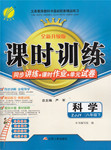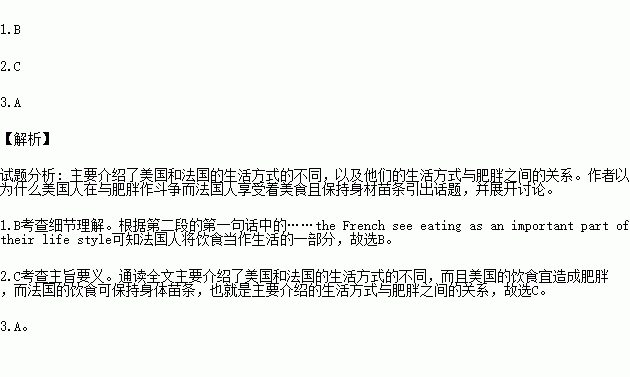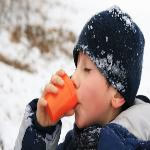题目内容
Why do Americans struggle with watching their weight, while the French, who consume rich food, continue to stay thin? Now a research by Cornell University suggests how life style and decisions about eating may affect weight. Researchers conclude that the French tend (易于) to stop eating when they feel full. However, Americans tend to stop when their plate is empty or their favorite TV show is over.
According to Dr. Joseph Mercola, a health expert, the French see eating as an important part of their life style. They enjoy food and therefore spend a fairly long time at the table, while Americans see eating as something to be squeezed (挤出) between the other daily activities. Mercola believes Americans lose the ability to sense when they are actually full. So they keep eating long after the French would have stopped. In addition, he points out that Americans drive to huge supermarkets to buy canned and frozen foods for the week. The French, instead, tend to shop daily, walking to small shops and farmers’ markets where they have a choice of fresh fruits, vegetables, and eggs as well as high-quality meats for each meal.
After a visit to the United States, Mireille Guiliano, author of French Women Don’t Get Fat, decided to write about the importance of knowing when to stop rather than suggesting how to avoid food. Today she continues to stay slim and rarely goes to the gym.
In spite of all these differences, evidence shows that recent life style changes may be affecting French eating habits. Today the rate of obesity - or extreme overweight - among adults is only 6%. However, as American fast food gains acceptance and the young reject (拒绝) older traditions, the obesity rate among French children has reached 17% - and is growing.
1.In what way are the French different from Americans according to Dr. Joseph Mercola?
A. They go shopping at supermarkets more frequently.
B. They regard eating as a key part of their life style.
C. They squeeze eating between the other daily activities.
D. They usually eat too much canned and frozen food.
2.This text is mainly about the relationship between ______.
A. children and adults B. Americans and the French
C. life style and obesity D. fast food and overweight
3.Where does this text probably come from?
A. A health report B. A book review
C. A TV interview D. A food advertisement
 课时训练江苏人民出版社系列答案
课时训练江苏人民出版社系列答案A schoolgirl saved her father's life by kicking him in the chest after he suffered a serious allergic (过敏的) reaction which stopped his heart.
Izzy, nine, restarted father Colm's heart by stamping (踩) on his chest after he fell down at home and stopped breathing.
Izzy's mother, Debbie, immediately called 999 but Izzy knew doctors would never arrive in time to save her father, so decided to use CPR.
However, she quickly discovered her arms weren't strong enough, so she stamped on her father's chest instead.
Debbie then took over with some more conventional chest compressions (按压) until the ambulance arrived.
Izzy, who has been given a bravery award by her school, said: "I just kicked him really hard.My mum taught me CPR but I knew I wasn't strong enough to use hands.I was quite scared.The doctor said I might as well be a doctor or a nurse.My mum said that Dad was going to hospital with a big footprint on his chest.”
"She's a little star," said Debbie, "I was really upset but Izzy just took over.I just can't believe what she did.I really think all children should be taught first aid.Izzy did CPR then the doctor turned up.Colm had to have more treatment on the way to the hospital and we've got to see an expert."
Truck driver Colm, 35, suffered a mystery allergic reaction on Saturday and was taken to hospital, but was sent home only for it to happen again the next day.The second attack was so serious that his airway swelled, preventing him from breathing, his blood pressure dropped suddenly, and his heart stopped for a moment.
He has now made a full recovery from his suffering.
1.From the passage, which of the sentences about Debbie is true?
A.She thought it useless to teach children first aid.
B.She thought if her daughter became a doctor, she would kick him harder.
C.She did nothing to help her husband.
D.She was proud of her daughter.
2.Izzy kicked her father in the chest ______ .
A.to express her helplessness
B.to practise CPR on him
C.to keep him awake
D.to restart his heart
3.What's the right order of the events?
①Izzy kicked Colm. ②Debbie called 999. ③Izzy learned CPR. ④Colm's heart stopped. |
A.3124
B.4231
C.3421
D.4312
4.What does Paragraph 8 mainly talk about?
A.What Colm suffered.
B.Colm's present condition.
C.What caused Colm's allergy.
D.Symptoms of Colm's allergic reaction.
5.Why does the author write the news?
A.To describe a serious accident.
B.To prove the importance of CPR.
C.To report a 9-year-old girl's brave act.
D.To call people's attention to allergic reaction.


